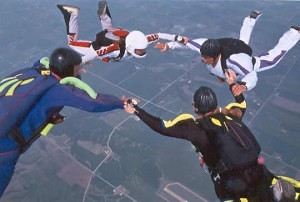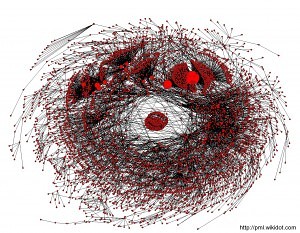 This is the fourth post in the What is Influence series. I appreciate and thank our contributors today, Erica Allison, Michelle Quillin and Davina Brewer. Each of them are influential in their own right; they engage with their communities, they blog with aplomb, and they are accessible to anyone who wants to learn from their expertise.
This is the fourth post in the What is Influence series. I appreciate and thank our contributors today, Erica Allison, Michelle Quillin and Davina Brewer. Each of them are influential in their own right; they engage with their communities, they blog with aplomb, and they are accessible to anyone who wants to learn from their expertise.
What’s amazing to me about this series is that one word can conjure (not negatively) so many thoughts from a wide variety of people who blend disciplines in this social media marketing space. Please come back tomorrow when we close the series with Aaron Sachs and Neicole Crepeau who wrap this first phase with more on measurement.
Again, I appreciate the many comments and tweets about the blog content. I have enjoyed this! (This one is a bit longer than most to squeeze them all in…have edited a tad, Ladies, I hope you don’t mind.)
Erica Allison is president of Allison Development Group in North Carolina. Her public relations and social media firm is active in fashion, design and other industries. She blogs at Spot On. I had the pleasure of meeting Erica at Social Slam recently!
I view Influence as a goal, something that I strategically work towards in business and in relationships. If my suggestions, advice, or identification of information and insight can make someone move from point A to point B or choose one option over another, then I’ve influenced that person or persons. If my work or writings can cause someone to stop and think, or review their point of view from another perspective, that’s influence.
I find that the success of one’s influence is directly related to one’s relationship and level of trust between the two parties (or more) in the relationship. If there is a high level of trust in what one person (the influencer) says or thinks, or in their credibility, based on their accomplishments and real life experiences, then that influencer has tremendous potential to change opinion, inspire action or change, and generally “influence” another.
In addition to relationships and level of trust and credibility, I think context is a major factor here as well. In the social media world, Klout is obviously the major measurement tool for influence. It’s convenient to say Klout doesn’t matter or it’s flawed, but it is a consideration among folks who work in the social media world and to ignore it may in fact result in lost work, lost credibility and lost opportunities.
For those folks NOT working in social media, and trust me, there are plenty, Klout has no relevance what so ever. Influence is measured by results, pure and simple. If you can’t deliver results, your level of influence is called into question. Understanding your own level of experience, credibility and relationship ‘capital’ is key in understanding your own level of influence.
Michelle Quillin is co-owner of New England Multimedia. I’ve had the immense pleasure of working with Michelle at The SMB Collective, and she inspired me to produce my first video that shall remain unpublished at this time. She is consummate marketer on Facebook and recently launched a new LinkedIn Group.
How do you possibly measure influence?
In the realm of marketing our services via social media, my behavior changes as I “see” patterns of behavior online, including my own behavior. I’m a student of people, of the way we think, of how we engage with brands, of how they engage with us. I pick up on how people (including myself) respond to calls-to-action, even subtle ones, and then I in turn make choices to implement tactics and strategies and test the response. Over time, I’m getting more and more strategic as I see what works. I bet I could’ve learned all of this in school, but maybe not. Maybe it’s all about influence.
I’m a youth minister (7 years now), working with teens, and let me tell you – they are very, very easily influenced by media and entertainment, and they in turn wield powerful influence among their peers. They don’t even realize its happening. I wonder if we’re the same? Are we all being influenced all the time, even in ways we don’t realize?
Davina Brewer is owner of 3 Hats Communications with a very spritely blog. She is one of the most prolific commenters I’ve ever had the privilege of knowing, and her opinions are on the leading edge.
The biggest obstacle to defining and measuring influence in the social arena is qualifying and quantifying motivation. My motivations have been to make real connections that develop my expertise, build my credibility and yes, someday lead to a network and a community of professionals which just may include referrals and money-growing trees. If I found better, more effective and profitable ways to develop my skills, build community and establish credibility, my motivations and therefore the influence would shift.
That said something by Gini may sway my opinion; she’s got me thinking of Livefyre. Something from someone else, because of a connection and friendship, may pull my attention to a particular blog post, on which I may or may not comment or RT. And someone’s perceived reputation and “Klout” may bias my opinions on someone’s authority and prestige.
We don’t always argue, debate or disagree with influencers or those in positions to possibly help further our own goals and objectives. Now we certainly are NOT a bunch of kiss-ass sycophants and I love that, I enjoy the intelligent debates and discussions. But I’ll read posts from many a TopNoOneElseCaresBigNumberList and be unimpressed, yet see mostly praise in comments. I’ll follow their tweets that seem pedestrian, downright ordinary.
I wonder WHY some have the reputation and influence they are reported to. Then I remind myself that they’ve built that reputation and cultivated their community over time, w/ lots and lots of hard work. And that anyone can think the same of me. It’s the WHY that’s the challenge. Things and people only influence us if we let them, right? So what influence I have (which is negative numbers) or who has influence over me gets into WHY I allow that, just not sure charting and graphing tweets and clicks will really reveal that.








